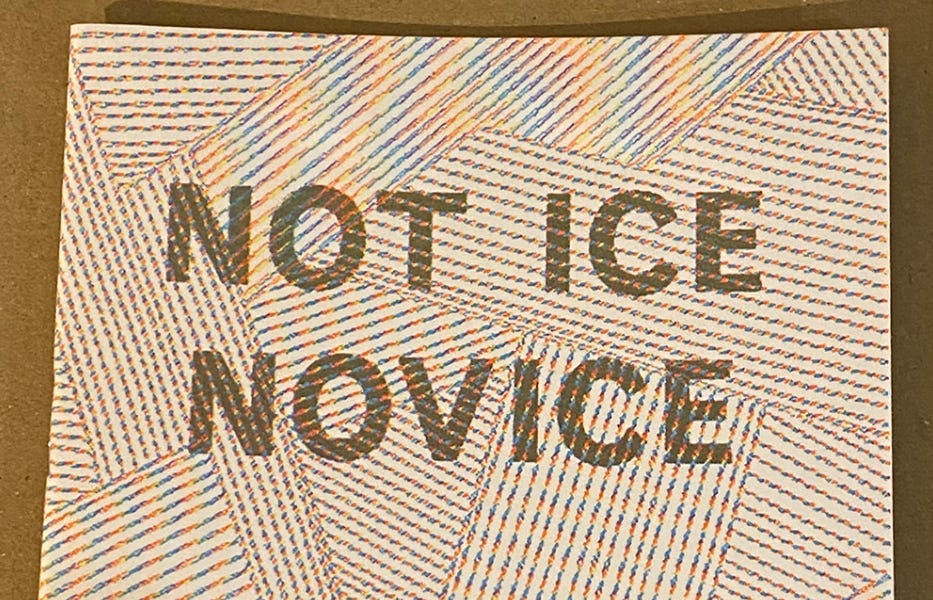luka
Well-known member
Prynne’s prolific recent poetry – more than two dozen small-press pamphlets since 2020 – also continues to contest the definition of itself. The ugly duckling of the brood, Snooty Tipoffs (2021), is a sumptuously printed, 300-page wedge of zany nonsense rhymes. Even to a reader used to Prynne’s ironic refusals of lyric decorum, these throwaway improvisations can feel like a rummage in a box of plastic cutlery: “My breakfast lies over the necklace / These weevils are evil to see”. As always, there is subtlety and eloquence to discover too (“dip flow in running current / Where fluted plumes fold slow and elegant”). But an alternative title might have been Curate’s Eggs.
What would Oliver, an excellent critic of Prynne’s work, make of it? He increasingly believed that poets should “vulgarise [themselves] and join in the chorus more fully”, comparing his own late style with Philip Guston’s turn from abstract expressionism to the cartoonishly figurative. In the almost offensively facetious vulgarity of Snooty Tipoffs, Prynne perhaps offers a knowing reply to his late friend.
Nothing in Prynne is purely ironic, however. As he writes to Oliver in 1987: “there is still a shimmer about the durable latency of the common rhymes … as if providence itself resided within these hazards of phonetic accident”. The context of this remark is a despoiled Thatcherite landscape of “yuppies and agribrokers”, and Prynne’s forays into pastoral have always been streaked by awareness of environmental damage. But the idea of a durable, natural “providence” has returned in his recent, rhyme-led verse as a kind of rewilding. His diction once stood at a severe distance from that of Heaney-esque nature poetry; now the “vulgar” names of flora and fauna concatenate in staccato patterns across tongue-twisting parataxis, like the roll call of a cacophonous ark. To quote At Raucous Purposeful (2022): “Such watch nuthatch, acrobatic darting head-down fawn stitchwort. / Patchwork”.
Prynne’s vision of the world is, he tells Oliver, “a patchwork of truths”: “when Pound lamented that the reality of Paradise was spezzato (or “jagged” …), his mistake was in the lament, not in the recognition”. Hence Prynne’s addiction to three-word titles that point in all directions, like fingerposts. Is Not Ice Novice (2022) a meditation on old age (“no man may be wise before / He’s lived his share of winters in the world”, advises the Old English elegy “The Wanderer” (trans. Richard Hamer)) or the ice-free future of climate change? Each delicately off-key, singsong page sets four quatrains in a square, their meanings circling: mid-sequence the corn crake (in decline since the mechanization of farming) appears opposite Babbage’s “difference engine” or proto-computer. This ominous juxtaposition ramifies into the memorably cracked later line “Penguin engine splinter”. The anthropocene itself becomes a patchwork of words stitched together by “common rhyme”, as the trappings of capitalism morph from cowrie trades to Amazon vans:
What would Oliver, an excellent critic of Prynne’s work, make of it? He increasingly believed that poets should “vulgarise [themselves] and join in the chorus more fully”, comparing his own late style with Philip Guston’s turn from abstract expressionism to the cartoonishly figurative. In the almost offensively facetious vulgarity of Snooty Tipoffs, Prynne perhaps offers a knowing reply to his late friend.
Nothing in Prynne is purely ironic, however. As he writes to Oliver in 1987: “there is still a shimmer about the durable latency of the common rhymes … as if providence itself resided within these hazards of phonetic accident”. The context of this remark is a despoiled Thatcherite landscape of “yuppies and agribrokers”, and Prynne’s forays into pastoral have always been streaked by awareness of environmental damage. But the idea of a durable, natural “providence” has returned in his recent, rhyme-led verse as a kind of rewilding. His diction once stood at a severe distance from that of Heaney-esque nature poetry; now the “vulgar” names of flora and fauna concatenate in staccato patterns across tongue-twisting parataxis, like the roll call of a cacophonous ark. To quote At Raucous Purposeful (2022): “Such watch nuthatch, acrobatic darting head-down fawn stitchwort. / Patchwork”.
Prynne’s vision of the world is, he tells Oliver, “a patchwork of truths”: “when Pound lamented that the reality of Paradise was spezzato (or “jagged” …), his mistake was in the lament, not in the recognition”. Hence Prynne’s addiction to three-word titles that point in all directions, like fingerposts. Is Not Ice Novice (2022) a meditation on old age (“no man may be wise before / He’s lived his share of winters in the world”, advises the Old English elegy “The Wanderer” (trans. Richard Hamer)) or the ice-free future of climate change? Each delicately off-key, singsong page sets four quatrains in a square, their meanings circling: mid-sequence the corn crake (in decline since the mechanization of farming) appears opposite Babbage’s “difference engine” or proto-computer. This ominous juxtaposition ramifies into the memorably cracked later line “Penguin engine splinter”. The anthropocene itself becomes a patchwork of words stitched together by “common rhyme”, as the trappings of capitalism morph from cowrie trades to Amazon vans:
She sells sea shells
on shore before in time
mortal shuttle at swells
ridden even to prime.




